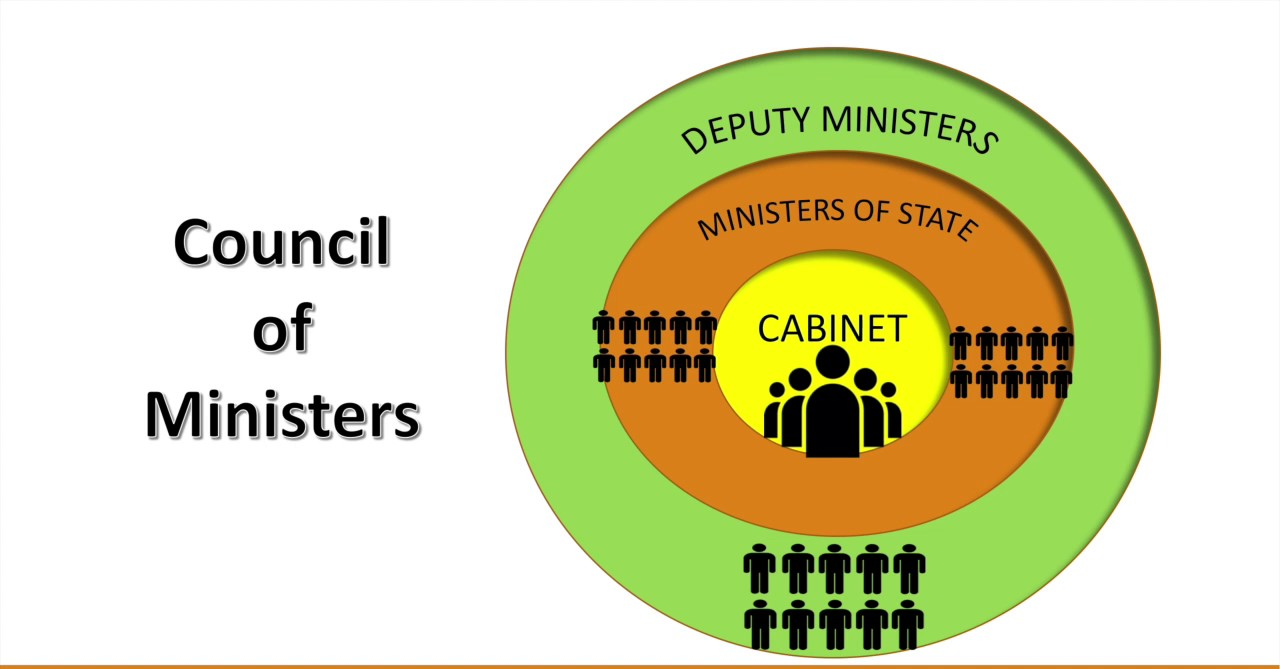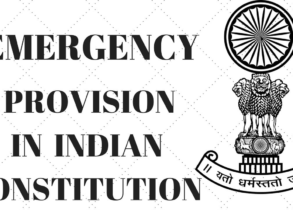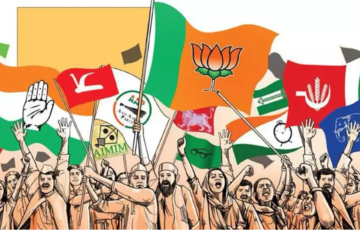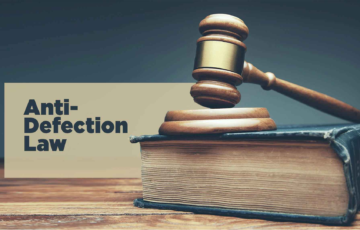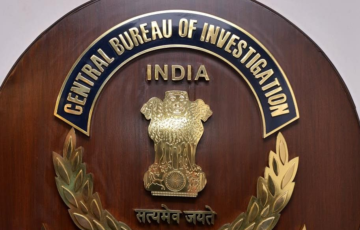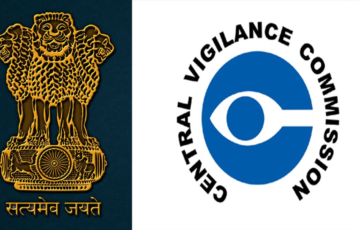STATE COUNCIL OF MINISTERS
Constitutional Provisions
| Article 163–Council of Ministers to aid and advise Governor | · Council of Ministers and Chief Minister: There is a Council of Ministers with the Chief Minister as its head. Their role is to aid and advise the Governor in the exercise of his functions, with the exception of matters where the Governor is required to act at their discretion.
· Governor’s Discretion: If there is any question about whether a matter falls within the Governor’s discretion, the Governor’s decision is final. The validity of any action taken by the Governor cannot be challenged on the grounds that the Governor should or should not have acted at their discretion. · Non-Inquiry into Ministerial Advice: The advice given by the Ministers to the Governor is not subject to inquiry in any court. In other words, the courts do not have the authority to examine or question the advice provided by the Council of Ministers to the Governor. |
| Article 164–Other Provisions as to Ministers | · The Chief Minister is appointed by the Governor, and other ministers are appointed on the Chief Minister’s advice.
· The total number of ministers, including the Chief Minister, cannot exceed 15% of the state legislative assembly’s total strength, with a minimum of 12 ministers. · Disqualified members due to defection cannot become ministers. · Ministers serve at the Governor’s pleasure and must be members of the state legislature. Non-members are disqualified after six months. · The Council of Ministers is collectively responsible to the state Legislative Assembly. · Ministers take oaths of office and secrecy administered by the Governor. · Salaries and allowances of ministers are determined by the state legislature. |
| Article 166–Conduct of Business of the Government of
a State |
· All executive actions in a state must be conducted in the name of the Governor.
· Orders and instruments must be authenticated as per rules set by the Governor; their validity cannot be questioned. · The Governor can establish rules for the efficient conduct of state government business, including the allocation of business among ministers, except in discretionary matters. |
| Article 167–Duties of Chief Minister | · Communicate decisions and legislation proposals to the Governor.
· Provide information requested by the Governor. · Submit matters for consideration by the council of ministers if required by the Governor. |
| Article 177–Rights of Ministers as Respects the Houses | · Ministers in the State Legislature have the right to speak and participate in the proceedings of the Assembly (and the Council where applicable) and any State Legislative Committee they are a member of. However, they do not have the right to vote. |
Qualifications
- To serve as a Minister in a State Council in India:
- The individual must be a member of the State legislature.
- If not a member, they must become one within six months of assuming office.
- Qualifications for State Legislature Membership:
- Citizenship of India.
- Loyalty to the Constitution of India.
- Minimum age of 30 years for the legislative council.
- Minimum age of 25 years for the legislative assembly.
Role and Functions of State Council of Ministers
| Formulation of Policies | · Ministers develop policies, covering various areas like public health, disability benefits, and more.
· The Cabinet makes key policy decisions, after which policies are approved. · Relevant government departments implement the policies. · Ongoing monitoring and evaluation help assess policy effectiveness. · If needed, policies may require legislative approval. · Public input may be sought to align policies with public needs and preferences. · Effective communication and transparency are essential throughout the process. |
| Administration and Maintenance of Public Order | · The executive power must be used in a way that ensures that state laws are followed.
· The Governor is empowered by the Constitution to create -rules for the more efficient conduct of government activities. · The Council of Ministers advises on all such regulations. |
| Appointments | · The Governor has the authority to appoint the Advocate-General and State Public Service Commission members.
· The Governor appoints the Vice-Chancellors of the State Universities, as well as members of numerous Boards and Commissions. These appointments cannot be made at the Governor’s discretion. On the advice of his ministers, he must carry out these duties. |
| Guiding the Legislature | · The legislative process typically involves government bills drafted by ministries. Ministers introduce, explain, and defend these bills in the State Legislature. Before each legislative session, the Cabinet outlines its legislative agenda in the Governor’s Address. |
| Control over the State Exchequer | · Control over the State Exchequer is primarily exercised by the Finance Minister, who presents the State budget to the Legislature, outlining revenue and expenditure estimates for the upcoming year. When it comes to Money Bills, only a Minister, recommended by the Governor, can introduce them. The executive holds the initiative in financial matters. |
| Execution of Central Laws and Decisions of the Union Government | · In India, the Union Government has the authority to give directives to state governments, ensuring compliance with central laws. State governments are responsible for implementing these laws, and they should not undermine the Union’s executive power. This division of powers maintains a balance in India’s federal system, and mechanisms exist to resolve disputes and maintain uniform implementation of laws across the country. |
Appointment
- Appointment of Ministers: The other ministers in the state government are appointed by the Governor but on the advice of the Chief Minister. This means that the Governor can only appoint individuals recommended by the Chief Minister.
- Tribal Welfare Minister Requirement: Originally, there was a provision that mandated the appointment of a tribal welfare minister in certain states with significant tribal populations and scheduled areas. The 94th Amendment Act of 2006 freed Bihar from this obligation due to changes in the tribal population and extended the provision to newly formed states like Chhattisgarh and Jharkhand.
- Membership in the State Legislature: Typically, ministers are members of either the state legislative assembly or legislative council. However, a person who is not a member of either house can also be appointed as a minister. Still, within six months of their appointment, they must become a member of either house, either through election or nomination, or they cease to be a minister.
- Participation in Legislative Proceedings: A minister who is a member of one house of the state legislature has the right to speak and take part in the proceedings of the other house (if the state has a bicameral legislature). However, they can vote only in the house of which they are a member.
Oath and Salary of Ministers
- Oath of Office: The minister swears to uphold the Constitution of India, safeguard the sovereignty and integrity of the country, conscientiously fulfill their duties, and act impartially, without fear or favor, according to the Constitution and the law.
- Oath of Secrecy: The minister pledges not to disclose any information brought to their attention as a state minister, except as required for their official duties.
- Ministers’ salaries and allowances are determined by the state legislature. They receive the same as a member of the state legislature, plus additional benefits like a sumptuary allowance based on their rank, free accommodation, travel allowances, medical facilities, and more.
Responsibility
- Collective Responsibility: The parliamentary system in India is based on the principle of collective responsibility. Article 164 of the Indian Constitution states that the council of ministers is collectively responsible to the state legislative assembly. This means that all ministers share joint responsibility for their actions and decisions before the legislative assembly. They work as a team and must resign if a vote of no confidence is passed. The principle also dictates that cabinet decisions are binding on all ministers, even if they initially disagreed in cabinet meetings. Ministers who can’t support a cabinet decision must resign. This ensures government unity and accountability.
- Individual Responsibility: Article 164 of the Indian Constitution also includes the principle of individual responsibility. It stipulates that ministers serve at the pleasure of the governor, which means the governor can remove a minister even when the council of ministers enjoys the legislative assembly’s confidence. However, the governor can dismiss a minister only based on the advice of the chief minister. In cases where there is a difference of opinion or dissatisfaction with a minister’s performance, the chief minister can request their resignation or advise the governor to dismiss them. This power allows the chief minister to uphold the principle of collective responsibility in the government.
Composition of the Council of Ministers
- The size and composition of a state council of ministers in India are not specified by the Constitution; instead, they are determined by the chief minister based on the current needs and circumstances.
- The state council of ministers consists of three categories of ministers:
- Cabinet Ministers: Cabinet ministers head important departments such as home, education, finance, and agriculture. They are members of the cabinet, attend its meetings, and play a significant role in policymaking across various aspects of the state government.
- Ministers of State: These ministers can either have independent charge of departments or be attached to cabinet ministers. They are not members of the cabinet and do not attend cabinet meetings unless specifically invited for matters related to their departments.
- Deputy Ministers: Deputy ministers do not have independent charge of departments. They are attached to cabinet ministers and assist them in administrative, political, and parliamentary duties. They are not cabinet members and do not attend cabinet meetings.
- Occasionally, a state council of ministers may include a Deputy Chief Minister, often appointed for local political reasons. The Chief Minister serves as the highest-ranking authority within the state government. The composition and roles of these ministers are flexible, allowing for adaptation to the unique needs of each state.
Cabinet
- Highest Decision-Making Authority: The cabinet serves as the top decision-making body in the political and administrative system of a state. Important policy decisions and matters of governance are discussed and decided upon in the cabinet meetings.
- Chief Policy Formulating Body: The cabinet is responsible for formulating and shaping government policies. Cabinet ministers, who are usually heads of various government departments, contribute to policy discussions and decisions.
- Supreme Executive Authority: The cabinet acts as the supreme executive authority of the state government. It oversees the implementation of laws, policies, and decisions made by the government.
- Chief Coordinator of State Administration: The cabinet coordinates various administrative activities within the state government. It ensures that different departments and agencies work together efficiently for the overall development and welfare of the state.
- Advisory Body to the Governor: While the governor is the constitutional head of the state, the cabinet serves as an advisory body to the governor. The governor often seeks advice and recommendations from the cabinet on important state matters.
- Chief Crisis Manager: During emergencies and crisis situations, the cabinet takes charge. It formulates emergency plans, allocates resources, and makes quick decisions to manage the crisis effectively.
- Dealing with Legislative and Financial Matters: The cabinet deals with significant legislative matters, including proposing and discussing bills in the state legislature. It also manages financial matters, including budget formulation and allocation of funds for various projects and initiatives.
- Control over Higher Appointments: The cabinet exercises control over higher appointments, such as constitutional authorities (like members of state commissions) and senior secretariat administrators. These appointments are crucial for the functioning of the state government, and the cabinet ensures that qualified individuals are appointed to these positions.
Cabinet Committees
- Cabinet committees are subgroups within a government’s cabinet. There are two types: standing (permanent) and ad hoc (temporary). They are set up by the chief minister or head of government based on the needs of the time. Cabinet committees deal with specific issues, formulate proposals, and make decisions. The full cabinet can review and ratify their decisions, ensuring consensus. Ad hoc committees are formed as needed and dissolved once the issue is resolved. Cabinet committees enhance efficiency in decision-making and utilize expertise within the cabinet.
Important Articles
|

